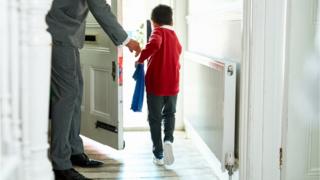 Image copyright
Image copyright
Getty Images
Attending primary school puts children and staff at no greater risk of contracting coronavirus than staying at home, a study of 131 schools suggests.
Tests to find out who had already had the virus found similar levels of antibodies in pupils and teachers.
But the study, of 12,000 adults and children in England, was carried out in June and early July, when there were very few cases around.
Experts say more studies are needed, when all children are attending school.
Pupils and staff were tested during the last six weeks of the summer term when Reception, Year 1 and Year 6 children could return to school. Many more have gone back in the last few days.
Scientists from Public Health England, who led the study, found just three people (one child and two staff) tested positive for the virus – 0.02% of those swabbed.
There was no evidence that any of these three people passed the virus on to others they lived with or worked with. This reflects previous research by PHE showing low numbers of cases and outbreaks in schools.
Table Of Contents
Antibody levels
A separate sample of 2,100 staff and children, who were tested for antibodies, found 10.6% of pupils and 12.7% of staff had previously had coronavirus.
This could suggest that children are as likely as adults to be infected, rather than being less susceptible to the disease.
But because so few positive cases in children are detected, it confirms previous research that they are likely to experience mild symptoms, or none at all.
The study found children and staff who attended school more frequently were no more likely to test positive for antibodies than those who did not attend school, or went less often.
This could indicate that infection levels in schools are simply reflecting virus levels in the communities where people live.
However, some groups were more likely to have antibodies – they were non-white, lived in the same house as a healthcare worker and had experienced symptoms.
Secondary schools were not included in the study, so no conclusions can be drawn about older children.
‘Reassuring’
Dr Shamez Ladhani, consultant epidemiologist, from Public Health England said: “This is the largest study of its kind in the country and suggests attending preschool and primary school brings no additional risk to either staff or students.
“Although these results are preliminary, they should be very reassuring to parents who may be anxious about their children returning to school.”
Dr Liz Whittaker, clinical lecturer and consultant paediatrician, from Imperial College London, said it was a “good quality study” but “limited by timing” as there was very low transmission of coronavirus during the period studied.
“It is essential that studies such as these continue over the next few months, and importantly, are also performed in secondary school and college settings,” she added.
Prof Ravindra Gupta, professor of clinical microbiology at the University of Cambridge, cautioned that schools would now be coping with two to six times more children, which could alter the results.
“There is less ability to socially distance than schools were able to in June. We must not be complacent and falsely reassured. We must ensure adequate monitoring and testing strategies to pick up infections in schools before they spread,” he said.
Regarding the finding that children were often asymptomatic, Prof Gupta said that meant “children may still continue to attend school if we do not regularly test for the virus in schools”.
- WILL COVID-19 CHANGE THE WORLD OF WORK FOR GOOD?: Is working from home a long-term solution?
- “WE’RE ALL STRONGER THAN WE THINK”: What are the positives of 2020?